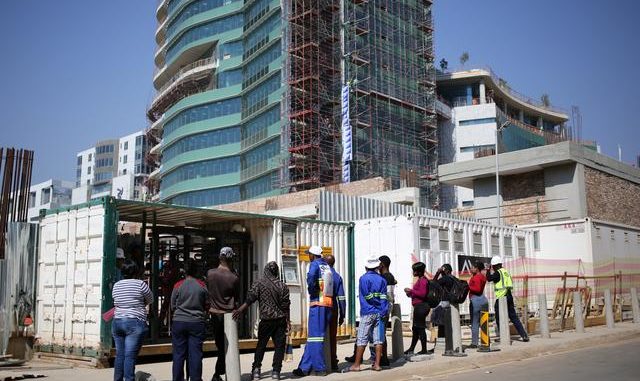
A global treaty aimed at protecting workers from violence and harassment is expected to be agreed next month, though some “tricky” issues remain, the International Labour Organization (ILO) said on Wednesday.Job seekers are seen outside a construction site in Johannesburg, South Africa September 8, 2017. REUTERS/Siphiwe Sibeko
The unresolved issues are focused on the extent to which employers should be held responsible for such behavior and on whether to include specific reference to protecting LGBTi people, ILO director-general Guy Ryder said.
African states in particular are opposed to including LGBTi (lesbian, gay, bisexual, transgender, and intersex) people among groups deemed vulnerable to violence or harassment in the workplace, sources close to the talks told Reuters.
The U.N. labor agency, which will hold its centenary annual conference on June 10-21, began negotiations on the treaty a year ago as the #MeToo global movement against sexual harassment shone a spotlight on the issue.
“In the light of the progress previously made, in light of the importance of the subject matter, I am very confident that the conference will adopt a convention and recommendation,” Ryder told a news briefing hosted by ACANU, the U.N. correspondents’ association in Geneva.
“And this will form the basis, I hope, of intensified activity in the ILO but also at member-state level to combat what remains a very, very prevalent problem at work, the issues of violence and of harassment,” he said.
Member states, employer groups and workers’ representatives take part in negotiations for ILO Conventions, which are legally binding on ratification, and recommendations that give guidance on good practices.
Employers say the proposed definitions of violence and harassment are “too vague”, Ryder said.
“And there is a major debate about whether LGBTi should be listed specifically and explicitly,” he said.
The ILO employers’ group pledged to help eradicate unacceptable behavior in the workplace, but said the draft was “massively ambiguous” and noted that employers should also be protected from violent or threatening behavior.
“Given the broad concept of the world of work, employers will have to bear the responsibility related to incidents involving people they have never even met (job-seekers for example); in places beyond their reach (public spaces) and in situations beyond their control (work-related trips). This could have disturbing consequences particularly for small and medium-sized enterprises,” the group said in a statement.
It said LGBTi people deserve specific mention in the Convention’s list of vulnerable groups “as they are often exposed to high risk of violence or harassment.”
Editing by Helen Popper
GENEVA (Reuters) –
